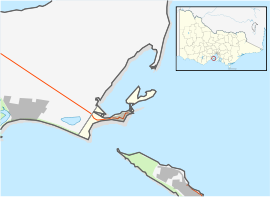Queenscliff, Victoria
|
Queenscliff Victoria |
|||||||||||||
|---|---|---|---|---|---|---|---|---|---|---|---|---|---|

Looking east over Queenscliff to Sand Island. On the left is Swan Bay and the right is Port Phillip Bay.
|
|||||||||||||
| Coordinates | 38°16′0″S 144°39′0″E / 38.26667°S 144.65000°ECoordinates: 38°16′0″S 144°39′0″E / 38.26667°S 144.65000°E | ||||||||||||
| Population | 1,416 (2006 census) | ||||||||||||
| Postcode(s) | 3225 | ||||||||||||
| Elevation | 15 m (49 ft) | ||||||||||||
| Location | |||||||||||||
| LGA(s) | Borough of Queenscliffe | ||||||||||||
| State electorate(s) | Bellarine | ||||||||||||
| Federal Division(s) | Corangamite | ||||||||||||
|
|||||||||||||
Queenscliff is a small town on the Bellarine Peninsula in southern Victoria, Australia, south of Swan Bay at the entrance to Port Phillip. It is the administrative centre for the Borough of Queenscliffe. At the 2006 census, Queenscliff had a population of 1,416.
Queenscliff is a former 1880s seaside resort now known for its Victorian era heritage and tourist industry and as one of the endpoints of the Searoad ferry to Sorrento on the Mornington Peninsula.
Prior to European settlement, it was inhabited by the Bengalat Bulag clan of the Wautharong tribe, a member of the Kulin nation.
European explorers first arrived in 1802, Lieutenant John Murray in January and Captain Matthew Flinders in April. The first European settler in the area was convict escapee William Buckley between 1803 and 1835, for a short time in a cave beneath the Point Lonsdale Lighthouse, with the local Aborigines.
Permanent settlement began in 1836 when squatters arrived. Shortland's Bluff was named in honour of Lieutenant John Shortland, who assisted in the surveying of Port Phillip. Land sales began in 1853, the same year the name was changed to Queenscliff by Lieutenant Charles La Trobe, in honour of Queen Victoria.
...
Wikipedia

